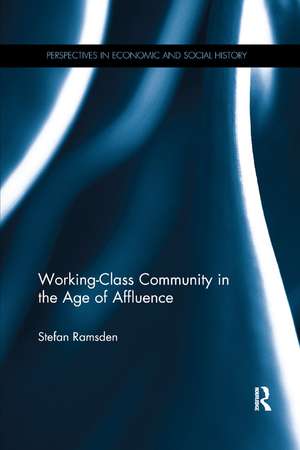Working-Class Community in the Age of Affluence: Perspectives in Economic and Social History
Autor Stefan Ramsdenen Limba Engleză Paperback – 12 dec 2019
Utilising an oral history case study of sociability and identity in the Yorkshire town of Beverley between the end of the Second World War and the election of Margaret Thatcher’s government, Working-Class Community in the Age of Affluence challenges this influential narrative. An introductory essay outlines how sociologists and historians understood the complex social, cultural and economic changes of the post-war decades through the prism of affluence, and traces how these changes came to be seen as deleterious to the ‘traditional’ working-class community. The book then proceeds thematically, exploring change across areas of social life including family, neighbourhood, workplace and associational life.
This book represents the first sustained historical analysis of change and continuity in working-class community living during the age of affluence. It suggests not only that older social practices persisted, but also that new patterns of sociability could strengthen as much as undermine community. Ultimately, Working-Class Community in the Age of Affluence asks us to rethink assumptions about the decline of local solidarities in this pivotal period, and to recognise community as a key feature of working-class life across the twentieth century.
| Toate formatele și edițiile | Preț | Express |
|---|---|---|
| Paperback (1) | 389.38 lei 6-8 săpt. | |
| Taylor & Francis – 12 dec 2019 | 389.38 lei 6-8 săpt. | |
| Hardback (1) | 847.73 lei 6-8 săpt. | |
| Taylor & Francis – 2 mar 2017 | 847.73 lei 6-8 săpt. |
Din seria Perspectives in Economic and Social History
-
 Preț: 311.81 lei
Preț: 311.81 lei -
 Preț: 277.56 lei
Preț: 277.56 lei -
 Preț: 310.55 lei
Preț: 310.55 lei -
 Preț: 312.34 lei
Preț: 312.34 lei -
 Preț: 449.41 lei
Preț: 449.41 lei - 18%
 Preț: 1109.99 lei
Preț: 1109.99 lei -
 Preț: 489.26 lei
Preț: 489.26 lei - 18%
 Preț: 1163.63 lei
Preț: 1163.63 lei - 18%
 Preț: 1057.89 lei
Preț: 1057.89 lei - 18%
 Preț: 1055.51 lei
Preț: 1055.51 lei -
 Preț: 132.04 lei
Preț: 132.04 lei -
 Preț: 212.61 lei
Preț: 212.61 lei -
 Preț: 449.41 lei
Preț: 449.41 lei - 18%
 Preț: 946.61 lei
Preț: 946.61 lei - 18%
 Preț: 1057.89 lei
Preț: 1057.89 lei - 18%
 Preț: 1062.62 lei
Preț: 1062.62 lei - 18%
 Preț: 1109.18 lei
Preț: 1109.18 lei - 18%
 Preț: 1111.55 lei
Preț: 1111.55 lei - 18%
 Preț: 1056.28 lei
Preț: 1056.28 lei - 18%
 Preț: 1054.71 lei
Preț: 1054.71 lei - 18%
 Preț: 1056.28 lei
Preț: 1056.28 lei - 18%
 Preț: 1161.28 lei
Preț: 1161.28 lei - 18%
 Preț: 1111.55 lei
Preț: 1111.55 lei - 18%
 Preț: 1111.55 lei
Preț: 1111.55 lei - 18%
 Preț: 1002.63 lei
Preț: 1002.63 lei - 18%
 Preț: 1110.74 lei
Preț: 1110.74 lei -
 Preț: 449.41 lei
Preț: 449.41 lei - 18%
 Preț: 1110.74 lei
Preț: 1110.74 lei -
 Preț: 445.95 lei
Preț: 445.95 lei - 18%
 Preț: 1057.09 lei
Preț: 1057.09 lei - 18%
 Preț: 1053.16 lei
Preț: 1053.16 lei - 18%
 Preț: 702.31 lei
Preț: 702.31 lei - 18%
 Preț: 1054.75 lei
Preț: 1054.75 lei - 18%
 Preț: 1109.18 lei
Preț: 1109.18 lei - 18%
 Preț: 1057.09 lei
Preț: 1057.09 lei - 18%
 Preț: 1057.09 lei
Preț: 1057.09 lei - 18%
 Preț: 1109.18 lei
Preț: 1109.18 lei - 18%
 Preț: 1055.51 lei
Preț: 1055.51 lei - 18%
 Preț: 1162.84 lei
Preț: 1162.84 lei - 18%
 Preț: 1163.63 lei
Preț: 1163.63 lei - 18%
 Preț: 1115.51 lei
Preț: 1115.51 lei - 18%
 Preț: 1004.20 lei
Preț: 1004.20 lei - 18%
 Preț: 998.71 lei
Preț: 998.71 lei
Preț: 389.38 lei
Nou
Puncte Express: 584
Preț estimativ în valută:
74.51€ • 77.79$ • 61.66£
74.51€ • 77.79$ • 61.66£
Carte tipărită la comandă
Livrare economică 04-18 aprilie
Preluare comenzi: 021 569.72.76
Specificații
ISBN-13: 9780367874797
ISBN-10: 0367874792
Pagini: 216
Dimensiuni: 156 x 234 x 12 mm
Greutate: 0.45 kg
Ediția:1
Editura: Taylor & Francis
Colecția Routledge
Seria Perspectives in Economic and Social History
Locul publicării:Oxford, United Kingdom
ISBN-10: 0367874792
Pagini: 216
Dimensiuni: 156 x 234 x 12 mm
Greutate: 0.45 kg
Ediția:1
Editura: Taylor & Francis
Colecția Routledge
Seria Perspectives in Economic and Social History
Locul publicării:Oxford, United Kingdom
Public țintă
Postgraduate and UndergraduateCuprins
Chapter 1. Introduction
Chapter 2. Families
Chapter 3. Neighbours
Chapter 4. Friends
Chapter 5. Workplaces
Chapter 6. Civil Society and Associational Life
Chapter 7. Identity and Place
Chapter 8. Conclusion
Appendix. Brief biographical details of research participants
Chapter 2. Families
Chapter 3. Neighbours
Chapter 4. Friends
Chapter 5. Workplaces
Chapter 6. Civil Society and Associational Life
Chapter 7. Identity and Place
Chapter 8. Conclusion
Appendix. Brief biographical details of research participants
Notă biografică
Stefan Ramsden is post-doctoral researcher at University of Hull, UK. After a decade working in the museums sector, he decided to pursue his interest in working-class history through returning to full-time study, and completed a PhD in 2013. Since then he has worked as a history teacher, lecturer and researcher in the University of Hull.
Recenzii
"Working-Class Community offers an important contribution to the history of affluence and the working classes in modern Britain that should appeal to researchers interested in the interactions between people, society and places. This long-term study shows that affluence was a time of both continuity and change rather than transformation, providing an analysis of different life stages and contexts to critique narrow conceptualisations of community. Reasserting the value of the local, Working-Class Community showcases the complexity that underpinned working-class sociability throughout the twentieth century." — Isabelle Carter in Contemporary British History, 33:2, 290-291.
Descriere
Utilising an oral history case study of sociability and identity in the Yorkshire town of Beverley between the end of the Second World War and the election of Margaret Thatcher’s government, this book challenges this influential narrative. An introductory essay outlines how sociologists and historians understood the complex so
